
-
Find the right food for your petTake this quiz to see which food may be the best for your furry friend.Find the right food for your petTake this quiz to see which food may be the best for your furry friend.Featured products
 Adult Small & Mini Lamb Meal & Brown Rice Recipe Dog Food
Adult Small & Mini Lamb Meal & Brown Rice Recipe Dog FoodFor the faster metabolism of Small & Mini dogs
Shop Now Adult 7+ Small & Mini Chicken & Brown Rice Recipe Dog Food
Adult 7+ Small & Mini Chicken & Brown Rice Recipe Dog FoodFor the unique nutritional needs of mature Small & Mini dogs
Shop Now Hill's Science Diet Adult Oral Care Chicken, Brown Rice & Barley Recipe Dog Food
Hill's Science Diet Adult Oral Care Chicken, Brown Rice & Barley Recipe Dog FoodClinically proven kibble technology to reduce plaque & tartar build-up
Shop NowFeatured products Adult Indoor Chicken Recipe Cat Food
Adult Indoor Chicken Recipe Cat FoodSupports energy level and beautiful fur in indoor cats
Shop Now Hill's Science Diet Adult Sensitive Stomach & Skin Dog Food
Hill's Science Diet Adult Sensitive Stomach & Skin Dog FoodHighly digestible recipe, gentle on stomachs. Nourishes skin & promotes a lustrous coat
Shop Now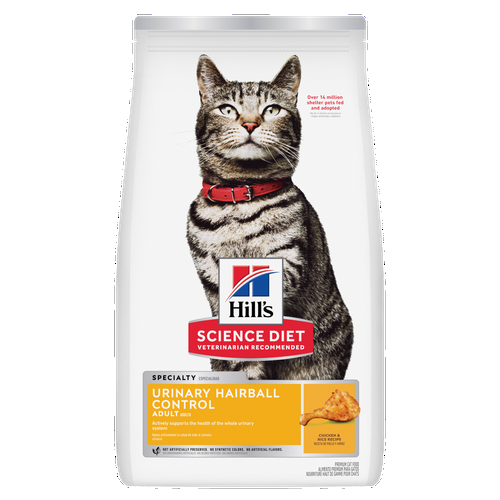 Adult Urinary Hairball Control Chicken & Rice Recipe Cat Food
Adult Urinary Hairball Control Chicken & Rice Recipe Cat FoodActively supports the health of the whole urinary system
Shop Now -
Featured articles
 My Pet Ate a Lizard — What Should I Do?
My Pet Ate a Lizard — What Should I Do?Learn what to do if your pet eats a lizard, including whether they can be toxic and symptoms to keep an eye on when they've swallowed one.
Read More 15 Pet-Friendly Cities Ideal for a US Road Trip
15 Pet-Friendly Cities Ideal for a US Road TripCheck out our list of pet-friendly U.S. cities that are excellent travel options, offering off-leash dog parks and pet-friendly restaurants & hotels.
Read More Easy DIY Dog & Cat Toys: Nine of Our Favorites
Easy DIY Dog & Cat Toys: Nine of Our FavoritesBrowse this comprehensive guide for several of our favorite DIY dog and cat toys that are sure to put a little pep in your pet's step.
Read More -


What is brain aging in dogs?
Just like the rest of the body, the brain is affected by the aging process. Damage to the brain’s cells can lead to changes in your dog’s behavior and alertness.
It's important to remember that aging is a natural part of your dog's life. Half of all dogs 8 years and older will show some signs of brain aging, and as your dog ages, he may begin to act differently. Thanks to advances in medicine and pet nutrition, the right dog food and veterinary advice can help limit the effects of brain aging and maintain your dog’s activity level.
What causes my dog’s brain to age?
Aging takes a toll on a dog's entire body, including his brain. In recent years, scientists have made great strides in understanding the aging process. Today, many experts agree that aging is primarily caused by unstable oxygen molecules called free radicals. As the brain ages, free radicals cause damage to the cells. Although some free radicals may be caused by the effects of environmental conditions, the majority are produced by the body’s own metabolism.
The aging process attacks all body systems and organs in a dog, including the brain. The result is a loss of brain function, and often, the appearance of behavioral changes that were not present in a dog’s younger years.
Why is the brain susceptible?
- High lipid content, a prime target for free radicals
- High demand for oxygen
- Limited antioxidant defense and repair capabilities
- Nervous System tissue is especially vulnerable to attack by free radicals.
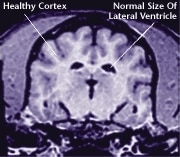 Healthy Older Brain | 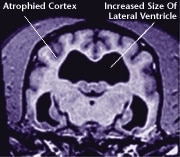 Older Brain with Damage |
| MRI scans show loss of brain tissue in affected dogs. Note: MRI scans are not harmful to dogs. | |
Older, compromised mitochondria produce less energy and more highly toxic free radicals
- Mitochondria are a source of energy production within cells, but also produce highly toxic free radicals as a by-product
- As the brain ages, mitochondria produce an ever-increasing number of free radicals
- Damage caused by free radicals leads to reduced brain function and possible behavioral changes
Little can be done to stop free radicals from being produced. Antioxidants, vitamins and minerals have been found to counteract the damage caused by free radicals and may help maintain normal behavior for a long and healthy life.
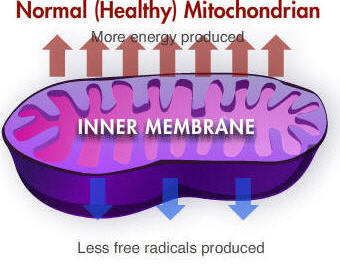 | 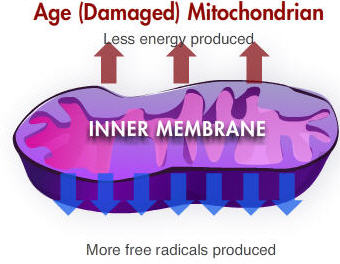 |


Tasty Tips
Is my dog showing signs of brain aging?
Changes in brain function occur very slowly. The first thing you’ll notice may be small differences in behavior, such as increased sleeping, lack of energy or irritability. You may not notice these changes until they start to interfere with your dog’s everyday life. The following signs are commonly used by veterinarians in the diagnosis of brain aging.
- House-soiling accidents
- No longer "asks" to go outside
- Doesn't greet family members
- Does not want attention/petting
- Does not recognize familiar people or places
- Does not respond to verbal cues
- Sleeps more during the day or less at night
- Appears lost or confused in the house or yard
- Wanders or paces
- Stares into space or at walls
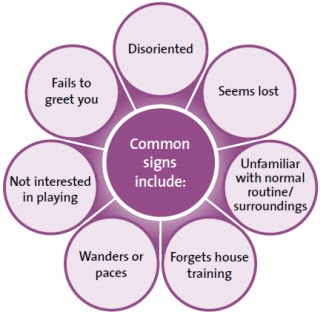
IMPORTANT:
If any of these signs are affecting your dog, discuss them with your veterinarian.
Treatment: The importance of nutrition
To keep your dog acting young and healthy, proper nutrition is important. As your dog ages, continue to feed him foods rich in antioxidants and essential nutrients to keep him active and alert. Older dogs can continue to have a high quality of life and the food your dog eats plays an important role in his overall health and well-being. Balanced nutrition is an essential part of an active, healthy lifestyle. For accurate diagnosis and treatment options, always consult your veterinarian and ask them to recommend the best food for your dog’s brain health.
Brain Aging Questions to Ask Your Veterinarian
- What kind of health risks do aging dogs have?
- Do older dogs need to visit the veterinarian more often?
- Do older dogs have special nutritional needs?
- Would a Hill’s® Prescription Diet® dog food help my aging dog’s brain?
- What if I have multiple dogs? Can I feed them all the same dog food?
- How can nutrition help with this condition? What is the benefit of feeding therapeutic nutrition as part of treatment which may include administering pills?
- What are the pros and cons of using nutrition to help manage my aging dog’s behavior and alertness?
- How long will I need to feed the recommended dog food to my dog?
- Ask how feeding a therapeutic dog food can help promote long-term benefits for my dog?
- What is the best way (email/phone) to reach you or your hospital if I have questions?
- Ask if you need a follow-up appointment.
- Ask if a reminder email or notice will be sent.


One of our staff authors prepared this article for you
Related products

For the unique nutritional needs of mature Small & Mini dogs

Clinically proven kibble technology to reduce plaque & tartar build-up

For the faster metabolism of Small & Mini dogs

Improves everyday ability to get up & go
Related articles

Understand the role that Omega-6 and Omega-3 fatty acids play in your dog's overall health, and how you can ensure they are getting enough.

Discover how the field of dog science is giving us more and more insights into the inner workings of our furry best friends.

Your dog's coat and skin are a big part of your dog's overall health. Ensure you keep your dog's coat healthy, by following these simple tips.

Learn basic steps & precautions for treating a cut on your dog, including what you can put on the cut, and when you should take them to the vet.

Put your dog on a diet without them knowing
Our low calorie formula helps you control your dog's weight. It's packed with high-quality protein for building lean muscles, and made with purposeful ingredients for a flavorful, nutritious meal. Clinically proven antioxidants, Vitamin C+E, help promote a healthy immune system.
Put your dog on a diet without them knowing
Our low calorie formula helps you control your dog's weight. It's packed with high-quality protein for building lean muscles, and made with purposeful ingredients for a flavorful, nutritious meal. Clinically proven antioxidants, Vitamin C+E, help promote a healthy immune system.

